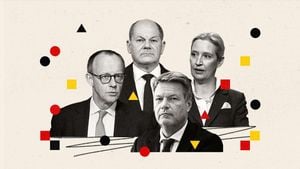Russian Deputy Foreign Minister Sergey Ryabkov has announced new discussions with U.S. diplomats, aimed at addressing irritants affecting bilateral relations. The talks are scheduled to take place at the end of the current week, marking the latest diplomatic effort to improve communication between the two nations.
"We are open to contact with the American side, particularly concerning irritants in bilateral relations. We are waiting for real progress when the meeting is held, scheduled for the end of the coming week," Ryabkov stated, as reported by TASS. This openness indicates readiness to engage constructively following recent tensions.
Ryabkov previously dismissed media reports claiming there would be meetings on February 25, specifying instead the discussions would occur toward the end of February and could extend to early March. The setting for these talks remains undecided, but there is potential for future interaction between parliamentary representatives and the directors of the respective countries' foreign ministries.
On February 18, the first round of negotiations took place in Riyadh, Saudi Arabia, where Russian and U.S. officials discussed the ground rules for future interactions and the possibility of presidential meetings to resolve the Ukrainian crisis. Following this preliminary meeting, President Donald Trump expressed confidence about the prospect of resolving the Ukrainian conflict, highlighting the significance of these diplomatic exchanges.
"There is also an agreement to precede the round at the deputy level with a consultative contact of the directors of the relevant departments," Ryabkov explained to RIA Novosti. This initial connection is fundamental to ensuring both sides are aligned on the topics to be discussed.
With previous engagements already setting the stage for potential progress, analysts are watching closely to see whether the new round of discussions will lead to tangible resolutions. The discussions are viewed as critically important for clarifying the frameworks of cooperation and addressing long-standing grievances.
While optimism surrounds the forthcoming meetings, it remains to be seen how both sides will navigate the challenges posed by external pressures and domestic political landscapes. Strained relations between Washington and Moscow have been characterized by contention over various global and regional issues, including Ukraine.
Ryabkov has previously emphasized the need for these diplomatic efforts to be conducted without external distractions or media speculation. He expressed hope for progress on elimination of irritants, which could pave the way for broader dialogue tackling more substantial issues affecting U.S.-Russia ties.
The geopolitical stakes involved mean any shifts, improvements, or breakthroughs could significantly impact international relations and regional stability, especially concerning Eastern Europe.
Discussions of possible presidential meetings were also mentioned, adding another layer of complexity and potential for escalation. While some officials, including Trump, have suggested improving communication between the leaders, others have cautioned against rushed conclusions without concrete outcomes from earlier meetings.
The upcoming dialogues will reflect the political will on both sides to engage directly amid swirling criticisms and media scrutiny of their countries’ foreign policies.
With questions surrounding the precise roles of various diplomats yet to be clarified, the outcome of these discussions may hinge on how effectively both parties can address each other's concerns.
Official responses from the U.S. side remain pending, but the willingness expressed by Ryabkov suggests there is room for negotiation and potential for positive developments over the next few weeks.
Observers will likely keep close tabs on how these discussions evolve and the responses they elicit from officials on both sides. The international diplomatic community continues to hope for constructive outcomes from this latest round of talks.



